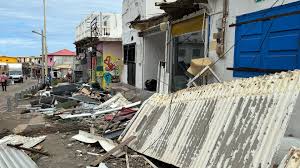Africa
Cyclone Chido: Assessing Damage and Rebuilding Efforts in Mozambique

Cyclone Chido leaves a trail of destruction in Mozambique, prompting urgent rebuilding efforts as communities recover from the devastating impact.
Pemba, Mozambique, initiated a rebuilding and cleanup effort on Monday after Cyclone Chido caused significant devastation in the southwestern Indian Ocean over Friday and Saturday.
The French weather service classified the cyclone as a category 4 storm, with winds surpassing 220 kph (136 mph).
Cabo Delgado province, which is home to around 2 million people, was the first area impacted. Numerous homes, schools, and health facilities were either partially or completely destroyed there.
In Pemba, some shelters housed displaced individuals, while others began the process of rebuilding their heavily damaged properties.
A UNICEF spokesperson emphasized that communities could be cut off from schools and health services for weeks, while local authorities cautioned about a high risk of landslides.
The southwestern Indian Ocean experiences its cyclone season from December to March, and recently, southern Africa has been hit by a series of intense storms.
In 2019, Cyclone Idai caused more than 1,300 deaths, with the most significant impact on Mozambique, Malawi, and Zimbabwe.
In the previous year, Cyclone Freddy led to over 1,000 fatalities across multiple countries in the region.
These cyclones present risks of flooding and landslides, with the resulting stagnant water potentially causing severe outbreaks of waterborne diseases like cholera, along with dengue fever and malaria.
Cyclone Chido caused extensive destruction in Mayotte, a French territory located in the Indian Ocean, leading to numerous fatalities as it moved toward Africa’s eastern coastline.
The Comoros Islands, situated to the north of Mayotte, were also battered by the storm, prompting authorities to issue the highest level of alert in some areas.
Malawi and Zimbabwe, both landlocked nations, were getting ready for the cyclone’s arrival. Malawi’s Department of Disaster Management Affairs issued a warning about potential flooding and recommended that residents in vulnerable areas relocate to higher ground.
In Zimbabwe, officials advised certain individuals to prepare for possible evacuation. Studies show that climate change is intensifying cyclones, yet it is the poorer nations in southern Africa—those contributing minimally to this global problem—that are bearing the brunt of major humanitarian crises.
